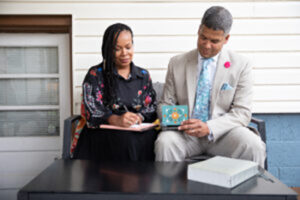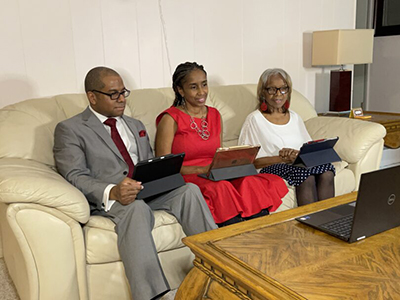
By Stacy M. Brown, Special to NNPA Newswire
Keith Thompson was alone again with his thoughts, and, as usual, it wasn’t good.
Recently divorced, drowning in debt and facing a fourth back surgery for chronic pain, the 48-year-old trucker no longer cared whether he lived or died.
Such mental and emotional distress haunts millions. A recent government survey showed a doubling since 2019 in the proportion of Americans reporting anxiety or depressive disorder symptoms.
The pandemic increased the number turning to unhealthy coping mechanisms, such as alcohol and substance abuse.
That’s what Thompson had tried since his teenage years as he battled depression and self-hatred.
Then an unexpected phone call changed everything for the Hebron, Ohio, resident.
Just days before his surgery, Thompson spoke to one of Jehovah’s Witnesses, a group known for their public preaching but now pivoting to phone calling and letter writing to share their Bible message during the pandemic.
It was a wake-up call for Thompson.
“I tried it my way for some 40 years, and look where it got me,” he said. “I thought I’d try God’s way for a change.”
After his surgery, Thompson started studying the Bible in earnest.
His instructor became his confidant and mentor, helping him use Bible principles to work through his intense negative feelings.
Thompson then began to help others by sharing in the ministry alongside the Witnesses.
“I got to the point where I felt, ‘I want to be alive,’” he said, “like I had done something worthwhile.”
Amid the pandemic, he became one of Jehovah’s Witnesses and made it his life’s work to reach out to comfort others with the Bible’s message of hope, love, and forgiveness that helped change his life, even studying the Bible with a man dealing with his own addiction and mental health issues.
Thompson’s transformation is no isolated phenomenon. Faith and the support of a congregation have helped many others turn the corner in their recovery.
“While the Bible does not indicate that spirituality cures medical problems, many have derived comfort and strength from what the Bible teaches and the practical guidance it provides,” said Robert Hendriks, U.S. spokesman for Jehovah’s Witnesses.
Hope, support, and positive coping skills aid mental health – whether these are built up by professional or faith-based sources, noted Lawrence Onoda, Ph.D., a clinical psychologist based in Mission Hills, California.
Even those with serious mental health conditions may find some aspects of religious participation help them cope with their symptoms, he said.
As one of the some 8 million in the United States who struggle with post-traumatic stress disorder (PTSD), Gloria Acosta knew she needed comfort even if there is no cure.
While an arduous journey towards sobriety through a veterans’ program helped her get stabilized and settled in her own apartment in Los Angeles, her journey stopped short of providing peace of mind.
“There was this constant fear,” recalled the 68-year-old.
“I nailed the windows shut, put extra locks on the door, kept the blinds closed.”
Then one Saturday, a ray of sunshine knocked at her door.
It was Elizabeth, a 12-year-old in yellow ruffles, whose innocence and boundless enthusiasm for the Bible message she was sharing disarmed Acosta.
Acosta started studying the Bible with Elizabeth, accompanied by others in the girl’s congregation of Jehovah’s Witnesses.
After years of fighting for her life on the streets, the faith Acosta was gaining, and the warm support of fellow believers gradually had an emotionally healing effect on her.
“I started feeling safe in my own surroundings,” said Acosta.
“I felt happy, which I had never felt before.”
Since becoming one of Jehovah’s Witnesses in August 2020, she’s removed all the extra locks on her doors.
Warm sunlight floods through her windows as she sits at her desk to join congregation meetings on a virtual platform since the pandemic started.
While her PTSD still causes sleepless nights, she expressed feeling at peace with God and herself. “I don’t have to be all those things that I thought I had to be to survive in life,” she said. “I can just be Gloria.”
The Hardrick family, of Westland, Michigan, also fought through survival mode for years as they struggled with both homelessness and cancer.
They stayed in a claustrophobic hotel room where drug deals and prostitution awaited just outside the door.
Leaving his wife, weak from chemotherapy and radiation treatments, there with his son shrouded Willie Hardrick in overwhelming anxiety every day as he headed to work.
“I was feeling defeated and useless—like I couldn’t do anything for my family,” he said.
Taking the advice of his Bible teacher to pray every day would calm him, though. Hardrick kept up with his Bible studies and got baptized during the pandemic. While his family eventually found a place to call their own, their anxieties weren’t over.
Hardrick soon got his own diagnosis of cancer spreading through his body.
“The congregation has helped me keep my sanity,” said Hardrick, recalling the meals, rides to the hospital and other practical assistance he received from fellow worshippers.
Even more than that congregation support system, the hope from the Scriptures is what his wife, Angela, said helps her through what can feel like a hopeless situation.
“I remind myself every single day that – no matter how bad things go – I have to look forward to the future: No more sickness, no more homelessness,” she said, referring to Bible teachings about a future free from suffering. “And with a brotherhood and their love that is so strong, you can overcome anything.”

